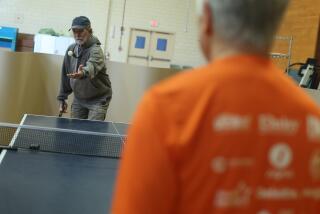A New View on Prostate Cancer
- Share via
It is better to treat prostate cancer in the elderly early on rather than to wait and watch for signs of progression, as is now commonly done, according to a new study that may change the care for many patients with the deadly disorder.
Surgery or radiation therapy in elderly men increases survival by at least 30%, raising median survival times from 10 years to more than 13 years, researchers reported Saturday at a prostate symposium in San Francisco.
The finding in a study of about 49,000 men “challenges long-held beliefs about prostate cancer treatment” by suggesting that treatment is better than so-called watchful waiting, said Dr. Paul Lange of the University of Washington, who did not participate in the study.
“It’s a wonderful paper that validates what many of us have believed for a long time,” said Dr. Mark Kawachi, director of the prostate cancer center at City of Hope National Medical Center in Duarte.
“Age, in and of itself, is not a definitive determinant of whether you should be excluded from treatment” for prostate cancer, he said.
Prostate cancer is the most common type of cancer among men, with about 235,000 new cases diagnosed in the United States this year and about 27,000 deaths, according to the American Cancer Society.
It is primarily a disease of the elderly, with about two-thirds of those afflicted over age 65.
But there is an “incredible controversy” over how to treat those older patients, said Dr. Yu-Ning Wong of the Fox Chase Cancer Center in Philadelphia, who led the new study.
Although it is clearly beneficial to treat younger men with the disease, many oncologists put off treatment of older ones on the assumption that most prostate cancers are slow growing. They reason that the afflicted individual is likely to die from some other cause before the prostate cancer becomes serious. Wong’s study is the first to compare treatment and no treatment in this age group. It is an observational study, so its results cannot be considered definitive, but the findings should provide guidance to physicians and patients who are unsure about how to proceed.
“There is a misconception that prostate cancer is universally an innocuous disease of the elderly,” said Dr. Howard Scher, chief of genitourinary oncology at the Sloan-Kettering Memorial Cancer Center in New York. With Wong’s and other studies, “we are clearly seeing that is not the case.”
Wong’s team studied Medicare records for 48,606 men age 65 to 80 who had survived for a year after a prostate cancer diagnosis. All were diagnosed between 1991 and 1999, with a median age of 72 at diagnosis.
A total of 19,948 men received radiation therapy, 14,098 underwent surgery and the remaining 14,560 were simply observed.
Wong reported Saturday that 27% of the men in the watchful waiting group were still alive, with a median survival time -- the period in which half the patients died -- of 10 years. In contrast, 59% of those who received either surgery or radiation therapy were still alive, with a median survival time of 13 years and growing.
The benefit of treatment was apparent even among men who were 75 to 80 at the time of diagnosis.
Radiation and surgery seemed to be equally effective in all age groups, she said.
The study results were “optimistic,” she said. “It is nice to know that what we have been doing for people is probably helping them.”
Critics said the findings might be biased somewhat because the researchers had no way of determining whether the prostate cancer patients may have had some other medical problem that precluded treatment for their cancer.
Wong said, however, that, even if allowance for the possibility of bias is made, “there is clearly a survival advantage associated with treatment.”
Kawachi said the study did not examine the potential side effects and complications of treatment, which may include urinary incontinence and sexual dysfunction, among other things.
It’s possible, he said, that some patients may live longer, but with a diminished quality of life.
If the patient is excessively concerned about those potential complications, “you have to wonder whether it is in the patient’s best interest to undergo treatment.”
But, he said, as treatments improve and the risk of complications diminishes, “then I think more of the older patient population can appreciate and enjoy the survival advantage offered by treating prostate cancer.”
Meanwhile, oncologists are eagerly awaiting results from a variety of other prostate-cancer trials that are in progress. Two trials, one conducted by the Department of Veterans Affairs and one in England, are randomly assigning men with prostate cancer to treatment and watchful waiting groups. Because those trials are prospective -- that is, researchers are randomly assigning patients into treatment / no-treatment groups rather than looking at results in hindsight -- the results are expected to be definitive.
Another large trial being conducted by the National Cancer Institute will determine whether yearly screening with a digital rectal exam and a PSA blood test -- used to detect a dysfunctional prostate -- will decrease prostate cancer deaths. Some scientists have argued that it does not.






